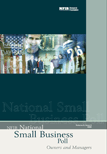Owners and Managers
• Eighty-six (86) percent of small, employing businesses are owner-managed, while 14 percent are managed by paid/professional managers.
• Professional managers are more likely to operate larger, small businesses, particularly those in the health and social assistance industries. Owner-managed firms are more likely to be in the construction and many of the service industries.
• Professional managers average 6 years of age less than owners, but both owner-managers and professional-managers have considerable tenure in their ventures, the former 16 years, three years more than the latter.
• Both professional managers and owner-managers possess considerably more formal education than their chronological peers. Almost one in five owner-managers holds an advanced or professional degree compared to 12 percent of professional managers.
• Women (54%) are more likely to be professional managers than men (46%), though men (74%) are more often owner-managers than women (26%).
• Professional managers are most likely to hold the titles of “General Manager,” “Office Manager,” or “Manager” contrasted to few who hold the titles of “CEO,” “Administrative Assistant” or “Secretary.”
• The principal owner is typically absent in 55 percent of professionally-managed firms and present in 43 percent of them. However, 94 percent of those whose principal owner is typically present continue to manage the business, even in the owner’s presence.
• The principal owner still works for professionally-managed businesses in 55 percent of cases. He/she is semi-retired or retired in 19 percent of them; 17 percent work in another business that he/she owns; and 6 percent work for an organization that they do not own.
• Sixty-one (61) percent of professional managers think that it is “highly likely” that they will own and operate their current business at some point and another 11 percent think it is “possible.” However, just 35 percent of owners who are not managers in professionally-managed firms think that the professional managers in their enterprises are “highly likely” to own and operate the firm some day and another 8 percent think it is possible. It appears a considerable number of professional managers will not realize their quest.
• Twenty-eight (28) percent of professional/paid managers are family members of one or more current owners. Family members are much less likely to think they will eventually take-over (own) the business than non-family managers.
• Ninety-three (93) percent of owners who are not managers of the business think that they are personally active in the major decisions affecting the enterprise.


